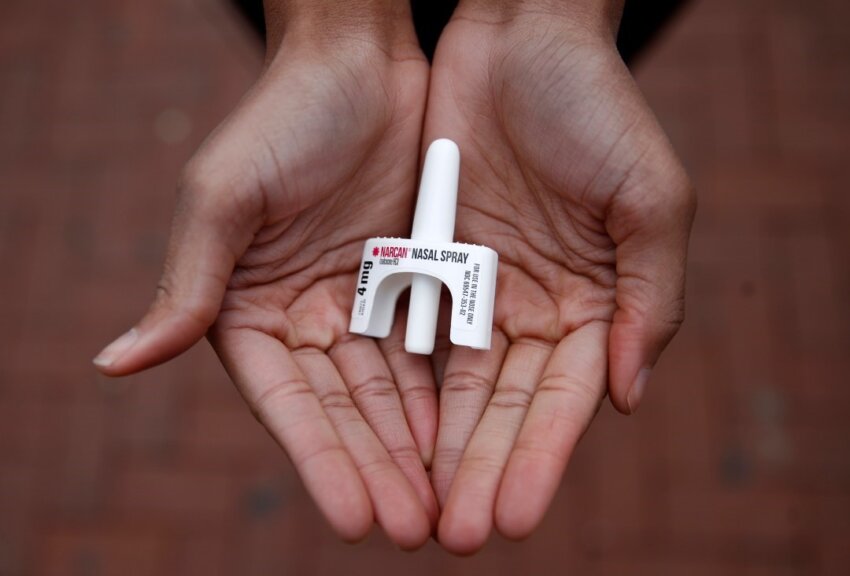Virtual training hit all counties with prior deaths, more than in-person training previously
Contact: Steven Lee, 210-450-3823, lees22@uthscsa.edu
SAN ANTONIO, April 25, 2023 – A new study shows that virtual training by the UT Health San Antonio School of Nursing on opioid overdose prevention reached more Texans during 16 months of COVID-19 than in-person training the same period before then, and in all counties with prior reported opioid deaths.
In all, the online training on the use of naloxone to reverse overdoses included nearly half of all Texas counties, including some areas where no deaths had been recorded. Most participants lived in communities with a shortage of mental health service providers, and training reached rural areas, even those with limited broadband internet availability, and majority Hispanic communities.
The school operates the state’s program for overdose prevention education and distribution of naloxone, commonly known by the commercial name Narcan®. It performs training on its use as part of the Texas Targeted Opioid Response program of the state’s Health and Human Services Commission, reaching first responders and friends of those at risk for opioid overdose.

“Distribution of naloxone and training on its proper use are the first of the evidence-based strategies for preventing opioid overdose deaths,” said Lisa Cleveland, PhD, APRN, professor at the UT Health San Antonio School of Nursing, and senior author of the case study in Harm Reduction Journal, titled, “Opioid overdose prevention education in Texas during the COVID-19 pandemic.”
Prior to the pandemic, the school conducted in-person naloxone training in major metropolitan areas and urban centers across Texas. The COVID-19 public health emergency declaration created a challenge to in-person training, but also an opportunity that the team leveraged to expand the program using a live, virtual education format.
“This transition increased participation above rates observed pre-pandemic and reached communities with the need for equipping those most likely to witness an opioid overdose with the proper use of naloxone,” said Charles Mathias, PhD, associate professor of psychiatry and behavioral sciences at UT Health San Antonio, and a co-author of the study.
The study team also includes Diana Cavazos, PhD, RN, Kelly McGlothen-Bell, PhD, RN, and Allison Crawford, PhD, RN, all with the School of Nursing; Brieanna Flowers-Joseph, MSN, RN, and pediatric nurse practitioner, Graduate School of Biomedical Sciences at UT Health San Antonio; and Zhan Wang, PhD, research instructor, Department of Population Health Sciences at UT Health San Antonio.
Naloxone rapidly reverses opioid-induced respiratory depression and hypotension that cause death. Access to naloxone and training on its administration is a public health intervention demonstrated to reduce the incidence of opioid overdose fatalities.
The School of Nursing has distributed more than 700,000 doses of naloxone statewide, with nearly 2,000 known cases of overdose reversals.
Training strategies have focused on the proper use of naloxone. To prepare laypersons, distribution is accompanied by training on recognizing an opioid overdose, administering naloxone, and providing basic first aid.
With the pandemic, the School of Nursing developed training using a two-hour live, online format. During the first 16 months of the virtual training – from November 2020 to March 2022 – the school delivered 82 training sessions to 1,982 participants across the state.
That was compared with the 16 months prior to that period, when 39 in-person sessions reached 1,242 participants – representing increases of 110% and 60%, respectively. Moreover, the virtual training reached a broad audience in 115 Texas counties, 45% of the total 254 counties, rather than primarily metropolitan counties.
And virtual training reached participants in all Texas counties reporting opioid overdoses in the two preceding years.
“Virtual outreach will likely remain essential for delivering prevention training during and after the COVID-19 pandemic,” Cleveland said.
Opioid overdose prevention education in Texas during the COVID-19 pandemic
Charles W. Mathias, Diana M. Cavazos, Kelly McGlothen‑Bell, Allison D. Crawford, Brieanna Flowers‑Joseph, Zhan Wang and Lisa M. Cleveland.
First published: March 24, 2023, Harm Reduction Journal
https://doi.org/10.1186/s12954-023-00769-y
The University of Texas Health Science Center at San Antonio (UT Health San Antonio) is one of the country’s leading health science universities and is designated as a Hispanic-Serving Institution by the U.S. Department of Education. With missions of teaching, research, patient care and community engagement, its schools of medicine, nursing, dentistry, health professions and graduate biomedical sciences have graduated more than 41,100 alumni who are leading change, advancing their fields and renewing hope for patients and their families throughout South Texas and the world. To learn about the many ways “We make lives better®,” visit UTHealthSA.org.
The UT Health San Antonio School of Nursing offers five academic programs, consisting of the BSN, DNP and PhD degrees and specialty certificates, and is dedicated to fostering diversity, equity and inclusion in the nursing profession. First-generation college students represent one-third of its enrollment. The school also operates a growing patient-care practice that provides primary and acute care at its Wellness 360 clinics, both on campus and at a variety of community partner sites. To learn more, visit https://www.uthscsa.edu/academics/nursing.
Stay connected with The University of Texas Health Science Center at San Antonio on Facebook, Twitter, LinkedIn, Instagram and YouTube.


